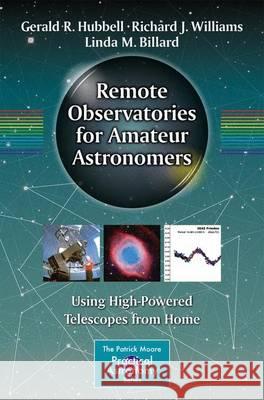Remote Observatories for Amateur Astronomers: Using High-Powered Telescopes from Home » książka
Remote Observatories for Amateur Astronomers: Using High-Powered Telescopes from Home
ISBN-13: 9783319219059 / Angielski / Miękka / 2015 / 235 str.
Amateur astronomers who want to enhance their capabilities to contribute to science need look no farther than this guide to using remote observatories. The contributors cover how to build your own remote observatory as well as the existing infrastructure of commercial networks of remote observatories that are available to the amateur. They provide specific advice on which programs to use based on your project objectives and offer practical project suggestions. Remotely controlled observatories have many advantages--the most obvious that the observer does not have to be physically present to carry out observations. Such an observatory can also be used more fully because its time can be scheduled and usefully shared among several astronomers working on different observing projects. More and more professional-level observatories are open to use by amateurs in this way via the Internet, and more advanced amateur astronomers can even build their own remote observatories for sharing among members of a society or interest group.
Endorsements: "Remote Observatories for Amateur Astronomers Using High-Powered Telescopes from Home, by Jerry Hubbell, Rich Williams, and Linda Billard, is a unique contribution centering on computer-controlled private observatories owned by amateur astronomers and commercialized professional-amateur observatories where observing time to collect data can be purchased. Before this book, trying to piece together all of the necessary elements and processes that make up a remotely operated observatory was daunting. The authors and contributors have provided, in this single publication, a wealth of information gained from years of experience that will save you considerable money and countless hours in trying to develop such an observatory. If you follow the methods and processes laid out in this book and choose to build your own remotely operated observatory or decide to become a regular user of one of the commercial networks, you will not only join an elite group of advanced astronomers who make regular submissions to science, but you will become a member of an ancient fraternity. Your high-technology observatory will contain a "high-powered telescope" no matter how large it is, and from the comfort of home, you can actively contribute to the work that started in pre-history to help uncover the secrets of the cosmos." Scott RobertsFounder and President, Explore Scientific, LLC. "In the past three and a half decades, since I first became involved with remote observatories, the use of remote, unmanned telescopes at fully automated observatories has advanced from a very rare approach for making astronomical observations to an increasingly dominant mode for observation among both professional and amateur astronomers. I am very pleased to see this timely book being published on the topic. I highly recommend this book to readers because it not only covers the knowledge needed to become an informed user of existing remote observatories, but also describes what you need to know to develop your own remote observatory. It draws on more than two decades of remote observatory operation and networking by coauthor Rich Williams as he developed the Sierra Stars Observatory Network (SSON) into the world-class network it is today. This book is the ideal follow-on to coauthor Jerry Hubbell's book Scientific Astrophotography (Springer 2012). Remote observatories have a bright future, opening up astronomy to a new and much larger generation of professional, amateur, and student observers. Machines and humans can and do work well together. I hope you enjoy reading this book as much as I have and will take advantage of the developments over the past several decades by the many pioneers of remote observatories." Russ Genet, PhD.
California Polytechnic State University Observing Saturn for the first time is a memory that stays with us for the rest of our lives, and for many it is the start of an odyssey--an odyssey into observational astronomy. Remote Observatories for Amateur Astronomers is a book written for observers, beginners, and old hands alike, providing detailed advice to those wishing to improve their observing skills. Many will want to build and operate a remotely controlled observatory, and for those, Part I of this book is an invaluable source of information. If, like me, you choose to avoid the capital outlay of owning your own facility, Part II describes how you can use one of the many professionally run large scopes where, for a few dollars, you can capture spectacular color images of nebulae, galaxies, and comets. My own scientific interest in short period eclipsing binaries has been made possible through the availability of remote telescopes such as those operated by the Sierra Stars Observatory Network (SSON). Whichever route you take, this book is essential reading for all who aspire to serious observing. David Pulley
The Local Group (UK)











